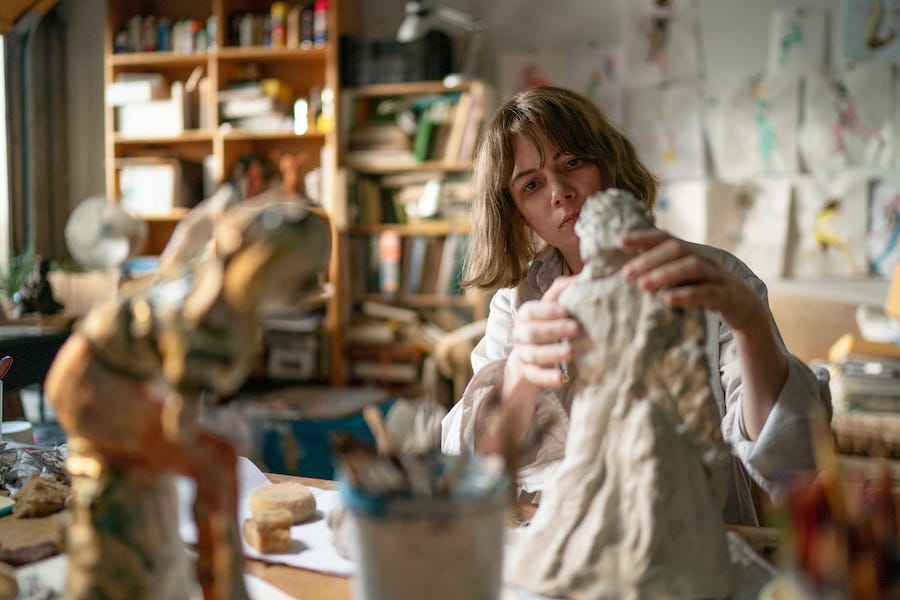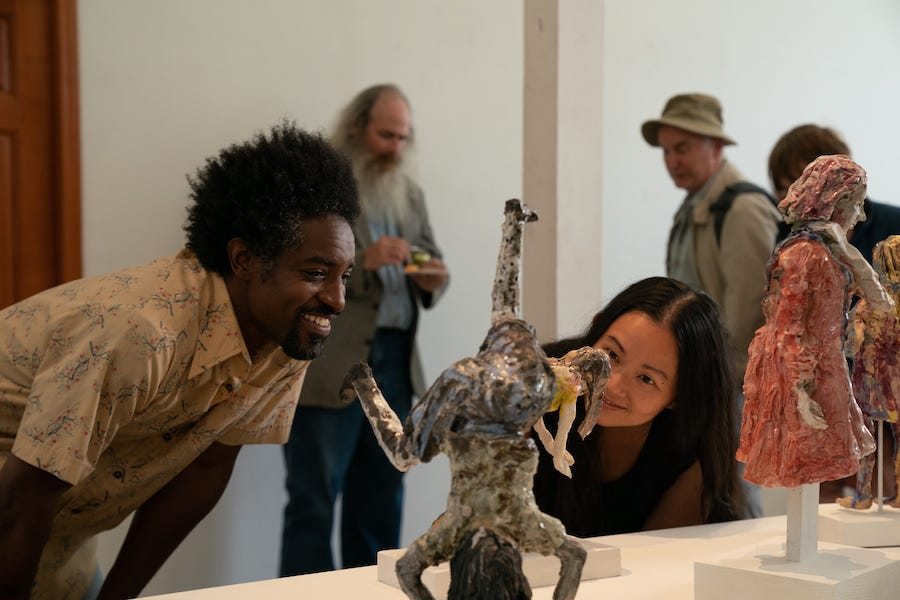Today’s newsletter is about artists—films by artists, about artists, including two starring Michelle Williams, how we carve out time and space for making art, and whether it’s worth it.
It’s been a light week of dining out since I did my taxes and a few innocuous strokes of the keyboard revealed that I paid far less to the federal government than they saw fit. During this brief period of self-imposed austerity, I managed a few loaves of fancy bread—including a dumbfoundedly delicious ham and cheese baguette—from the newly opened Alf Bakery (you will have to wait on line) to supplement all the homely, and homey, soups I’ve been making, more on that below. At least H&H and Philly Cream Cheese found a way to skirt NY sales taxes with a stuffed bagel. Fuck the man.
i. SHORT TAKES - “Artist films”
ii. FOOD // FILM - The Fabelmans, fake tablecloths, and soup
iii. NOW PLAYING - Showing Up
WASTELAND NO. 2 and NO. 3
Jodie Mack, 2019 and 2021
No 2: Hardy, Hearty is a six-minute tale of springtime: frozen ice cubes of leaves and flower buds melt on screen, transmitting an irrepressible sense of rebirth. The cuts become quicker, then faster still, epileptically ricocheting back and forth like a visual flip book. In between tangled roots and apoplectic poppies, a proliferating bulb of green reaches towards light. In lieu of sounds—the film is silent—I imagine smells: mint springs, loamy moss, April’s tulips.
No. 3: Moons, Sons is more akin to winter. Small mounded wreaths of flora and foliage are little worlds frozen unto themselves, a snowglobe that shrinks when the water runs dry. You can almost hear the squelching petals, moisture hoovered from the sepals. Nasturtiums shrivel, mums and babies breath collapses onto themselves, toothed leaves molder into brown—and then, blackness seizes the frame. Mack slackens the pace here (unlike in Wasteland No. 2) and lingers on this thudding dark, deliberating the vacant agony of death and the mournful beauty of decay.
GUSH
Fox Maxy, 2022
A work of calamitous resistance throbbing with life. This 71-minute digital collage of found and filmed footage, edited over the last nine years by Native American artist and filmmaker Fox Maxy, flickers with kinetic propulsion.
It’s difficult to summarize what occurs in this labile doc, which comprises scenes of two girls hanging out and talking shit while peeling oranges in the car, clips of that Naomi Campell-Tyra Banks interview, and more, sometimes with the 3D skeletons loosely jiving on top of the footage like Clippy the Microsoft Office assistant. Despite the deliriously quick pace of editing, Gush feels aqueous and smooth. It has the mutating energy of a wild night out, often laced with the threat of violence, moving from raucous party atmosphere to one of more somber contemplation.
THE DEMANDS OF ORDINARY DEVOTION
Eva Giolo, 2022
The title of Eva Giolo’s short, very much a a meditation on art and process, celebrating the quotidian, could double as the title for Kelly Reichert’s new film. This short muses on the the process of creating and making things, whether that is art or another human. Giolo erases the boundaries between care and creation alternating medium-close ups of different people rattan-weaving, lamp-building, pasta-rolling, with parents feeding, clothing, and bathing a baby, its soft clumps contrasting against the smoothness of materials being whittled down and refined.
Giolo casts a 16mm spell of sherbet hues (coral bricks, a periwinkle sweater, a hot pink binkie) and invokes a pendular rhythm with the metronomic winding of a Bolex, the operational hum of breast pumps, the purr of a potter’s wheel. Shots of a coin toss keep time, too, and remind us that creation and its consequences can be a crapshoot.
Cassatina for you:
Cerasella in Astoria (though my go-to dessert there is the ricotta e pera)
Villabate Alba in Bensonhurst
The candle version from Gohar World
THE FABELMANS
Steven Spielberg, 2022
Spielberg’s cinematic chicanery is never in doubt in this forcefully enchanting bildungsroman that mythologizes the director’s artistic journey. At first I didn’t buy into the improbable casting of Paul Dano and Michelle Williams as Spielberg’s Jewish parents, until halfway through the film I kept looking over my shoulder expecting to see my mother-in-law. The Fabelmans casts a more sympathetic eye towards Mitzi, young Sammy’s dancing-under-the moonlight goddess mother over his right-brain, pragmatist, engineer of a father, even though Spielberg’s body of work is clearly a byproduct of both, indebted to the former’s awe-filled wonder and the latter’s technological curiosity and tactical skills.
Grandpa Judd Hirsch’s intense speech about the gripping demands of art—instigator of dilemmas, family crisis, sleepless nights—is an intense precept to unload on a preteen, almost as harrowing as discovering that your beatific mother is cheating on your father through the lens of your beloved camera. If based on real events, this is some serious Mad Men shit that compels me to wonder what sort of trauma it inflicted on the young Steven. In the movie, ends up wielding the camera and movie-making as a weapon of truth, distorting the image of a prejudiced bully at his new high school.
In The Fabelmans, Michelle Williams’s character boldly circumvents the toil of culinary duties. To protect her “piano hands”, she chooses disposable tablecloths and paper plates, bundling them abruptly when she deems the meal’s end, instead of laboring over soiled pots and pans. This unconventional approach may seem brow-raising to some, like her mother-in-law (Jeannie Berlin), but its practicality is undeniable and I instantly recognize the appeal.
With early-onset arthritis in my right hand, I too would prefer not to do dishes, or at least as few as possible. One solution is the one-pot recipe—Melissa Clark's got a compendium of them—but other times, I want minimal execution, too, in addition to convenient clean-up. That’s what brothy soups are for: usually miso with daikon and a sprinkle of hondashi, or pre-packaged sachets of anchovy, shitake, and kombu.
In the non-Asian realm, I sizzle some garlic and carrots, add broth or water, and a handful of mint—a game-changing suggestion with Portuguese flair from a former coworker/current friend. Just remember to fish everything out and add enough salt. These provide a low-effort means of sustenance that isn’t too filling. I can’t function (or write) if I’m overly satiated so this keeps my mind lucid, and tides me over until I can have a more elaborate meal.
Porcelain paper plates from Virginia Sin above
- recipe for creamy one-pot pasta with chicken and mushrooms
Danny Bowien’s very calming miso soup tutorial
Bespoke soup foundations from Dashi Okume in Greenpoint
SHOWING UP
Kelly Reichert, 2023
There’s an “inspirational” quote that formulates success as 90% perspiration/10% inspiration that’s meant to underscore the importance of perseverance. But what if that’s not enough? At what point is the work still worth it? Kelly Reichert sneakily interrogates the cheesy, ultimately capitalist maxim on a scale both intimate and profound with this slice-of-life portrait of a “minor” artist.
While preparing for her gallery show, Lizzy (Michelle Williams) must contend with dispiriting obligations, exasperating banalities and the occasional fated surprise. She works a day job at an art college, where her mom is her boss, and the hot water heater hasn’t been fixed by her landlord (Hong Chau) who is also a friend with a more thriving artistic career. Lizzy is best described as a reluctant curmudgeon. She’s cranky, and you get the sense that she’s a deeply introspective individual, comfortable in her solitude, but not incapable of caring for others. She worries for her spiraling, savant-ish brother (John Magaro) and a misguided pigeon wounded by her orange tabby. Animals are enigmatic sages in Reichert’s films, often accommodating humanity’s missing sense of wonder.
In the lead role, Williams and her elfin impishness are unseated by the puckered mask of frustration. Her voice is reedy and strained, as if can only emit exasperations. She modulates her body into stiff curvature shuffling about campus or hunched over sculptures in a dim garage. The gnarled models of women caught mid-action, in varying poses of contortion, and painted bold sunset-hues, are the work of Cynthia Lahti. Muddling the line between beatific and anguished expressions, they are just the kind of work you’d think Lizzy would make. Meanwhile, Hong Chau as landlord-friend Jo lopes about with ebullience, and her soaring, cosmic installations (the work of Michelle Segre) require her whole body to manipulate the materials into submission.
Another way to regard Lizzy might simply be: annoying. But it’s she who is annoyed, and I would be, too, if someone kept bothering me while I was trying to work. Her anxieties culminate when audible revelries from Jo’s house (they live in a duplex) assail her focus the night before her opening.
Reichert’s movies are a gently burrowing, though never timid, force. As the film progresses, it becomes clear that this isn’t a story about a prodigious artist on the brink of discovery—nor does it suggest that she lacks the talent or potential for such. Finding Lizzy at a crossroads, Reichert draws attention the unglamorous mundanities that populate an artistic life and the value of showing up in the face of such distractions. The filmmaker models this by continuing to make modest but powerful pictures, devoid of sensationalized moments, and eschewing the Hollywood machine. She emphasizes it further in Showing Up by foregrounding vignettes of students and teachers (including Andre 3000) weaving, painting, dancing, and digging, poignantly allowing the work to take up the space and time it deserves.











